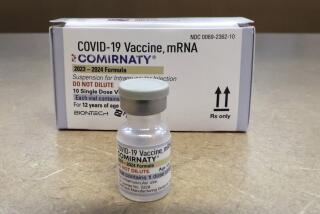More Funds Urged for Research on Aging : Health: Panel proposes that annual spending rise to about $912 million after five years. Chairman says the plan could save billions in medical costs.
- Share via
WASHINGTON — A panel of experts called Wednesday for substantial annual increases in federal spending for research on aging, saying that such an investment would reap “enormous” economic savings in health care costs.
“This is not a research agenda to keep you from dying--this is a research agenda to make life worth living,” said Julius R. Krevans, chancellor of UC San Francisco, chairman of the panel.
“If we were able to postpone for one month the onset of the type of disability that leads to an elderly patient being placed in a nursing home, we would be talking in terms of savings of more than $3 billion a year,” Krevans said.
The committee was convened by the Institute of Medicine, which is part of the prestigious National Academy of Sciences. The academy is a congressionally chartered, private organization that advises the federal government on matters of science and technology.
There are an estimated 33 million Americans 65 or older, and the number of individuals over 85 is growing six times as fast as the rest of the population, the panel reported.
The majority of older Americans “are vigorous and active well into advanced old age,” the committee reported. But, “for a growing number . . . these added years of life often are burdened by disability, dementia and the loss of independence,” it said.
The committee recommended that the current annual funding level of about $600 million for research on aging be increased every year to a total annual increase of $312 million after five years. This would bring the total annual funding level to about $912 million after five years, which would represent 0.5% of the amount spent on health care for that population.
In addition, the panel called for a onetime expenditure of $110 million for construction of new laboratories and other facilities to support the work.
The cost of health care for the elderly “is great and growing rapidly,” the panel reported. In 1987, for example, the latest figures available, the annual cost of care for elderly patients was $162 billion, compared with $45.2 billion a decade earlier.
Science “offers the best hope to improve the older person’s quality of life,” it said.
The committee urged that a special emphasis be placed on studying biomedical ethics affecting the elderly.
“Ethical issues are at the heart of research on this group but often are neglected,” Krevans said. “If we are to set priorities in aging research, we must explicitly include the area of biomedical ethics, exploring a range of issues from life-sustaining treatment to the participation of frail individuals in clinical trials.”
Elderly people suffering from dementia and incontinence may be “ideal” research subjects for studies of these disorders, “but they are also among those least likely or physically able to participate,” the panel said. It recommended that innovative approaches be developed to inform patients about research projects and to create ways to include them.
The panel recommended also that research be expanded on the impact of aging on the brain and proposed a new area of study: the process of abnormal cell proliferation, when the orderly replacement of cells that have been lost or destroyed goes awry, resulting in a range of diseases including cancer, osteoarthritis and impaired immune function.
Advocates for the elderly praised the report.
Congress and the Bush Administration should “heed the advice” in the report, which “recognizes the importance of aging research in promoting a high quality of life for older people, as well as curbing the rising tide of health care costs,” said Daniel Perry, executive director of the Alliance for Aging.
Rep. Edward R. Roybal (D-Los Angeles), chairman of the House Select Committee on Aging, said that the report “spells out an important agenda” and “will help myself and others continue the push” for more resources for research on aging.
The report “confirms that programs aimed at improving the health and increasing the independence of older Americans are blue-chip investments,” said Sen. Tom Harkin (D-Iowa), chairman of the Senate Appropriations subcommittee on labor, health and human services and education.
Harkin said his state leads the nation in the percentage of its people who are 85 or older. “We are where the rest of the nation will be by the turn of the century,” he said.
More to Read
Sign up for Essential California
The most important California stories and recommendations in your inbox every morning.
You may occasionally receive promotional content from the Los Angeles Times.













